Pressure Washing DeRidder
Find top Deck and Fence Cleaning in DeRidder
Receive multiple Pressure Washing quotes for your project today! Compare profiles, reviews, accreditations, portfolio, etc... and choose the best offer.
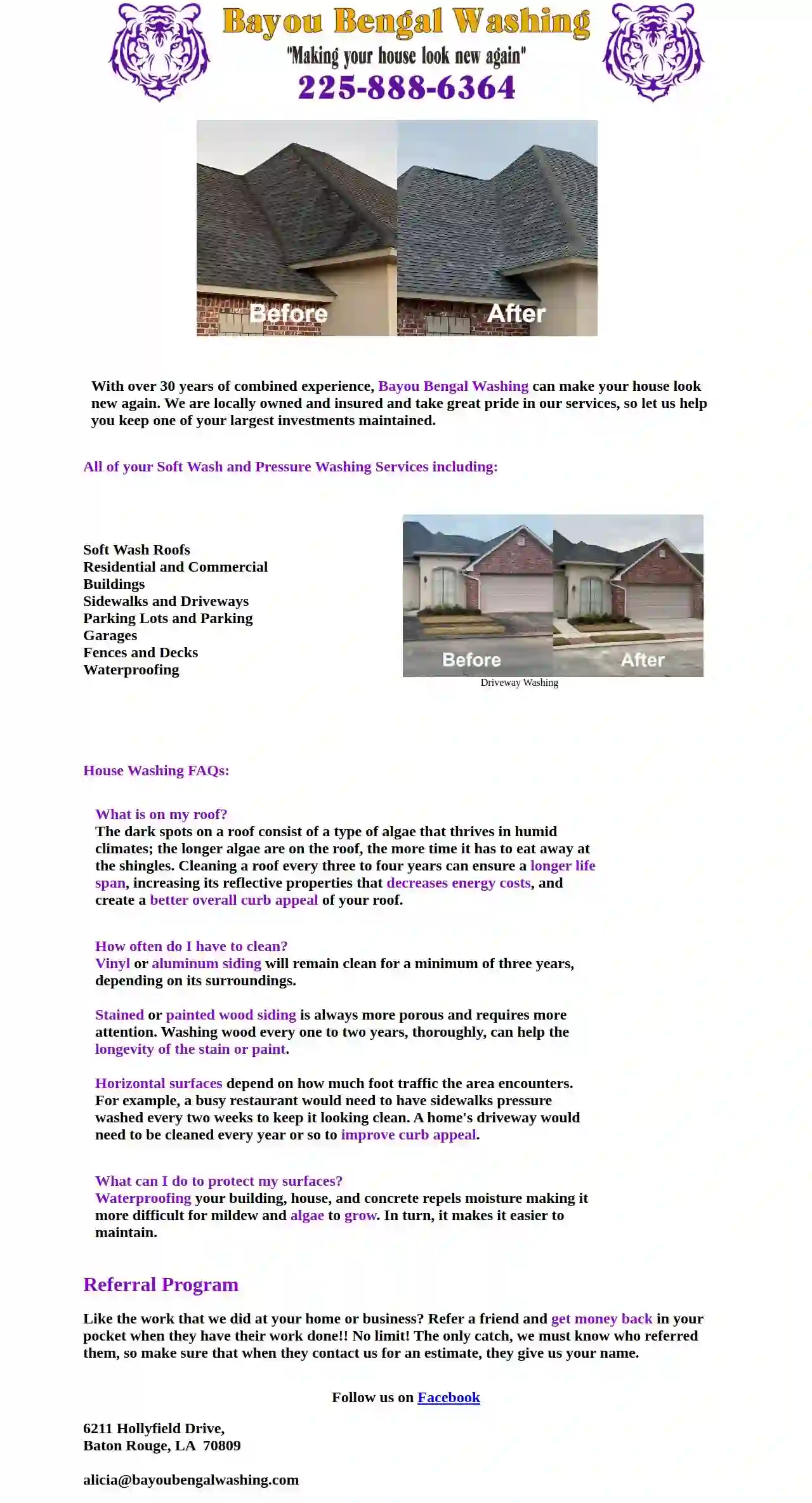
Bayou Bengal Washing
52 reviews6211 Hollyfield Drive, Baton Rouge, 70809, USWith over 30 years of combined experience, Bayou Bengal Washing can make your house look new again. We are locally owned and insured and take great pride in our services, so let us help you keep one of your largest investments maintained. All of your Soft Wash and Pressure Washing Services including: Soft Wash Roofs Residential and Commercial Buildings Sidewalks and Driveways Parking Lots and Parking Garages Fences and Decks Waterproofing Driveway Washing Sidewalk Washing Driveway Washing Walkway Washing Patio Washing Patio Washing House Washing FAQs: What is on my roof? The dark spots on a roof consist of a type of algae that thrives in humid climates; the longer algae are on the roof, the more time it has to eat away at the shingles. Cleaning a roof every three to four years can ensure a longer life span, increasing its reflective properties that decreases energy costs, and create a better overall curb appeal of your roof. How often do I have to clean? Vinyl or aluminum siding will remain clean for a minimum of three years, depending on its surroundings. Stained or painted wood siding is always more porous and requires more attention. Washing wood every one to two years, thoroughly, can help the longevity of the stain or paint. Horizontal surfaces depend on how much foot traffic the area encounters. For example, a busy restaurant would need to have sidewalks pressure washed every two weeks to keep it looking clean. A home's driveway would need to be cleaned every year or so to improve curb appeal. What can I do to protect my surfaces? Waterproofing your building, house, and concrete repels moisture making it more difficult for mildew and algae to grow. In turn, it makes it easier to maintain. Referral Program Like the work that we did at your home or business? Refer a friend and get money back in your pocket when they have their work done!! No limit! The only catch, we must know who referred them, so make sure that when they contact us for an estimate, they give us your name. Follow us on Facebook 6211 Hollyfield Drive, Baton Rouge, LA 70809 [email protected]
- Services
- Why Us?
- Our Team
- Gallery
Get Quote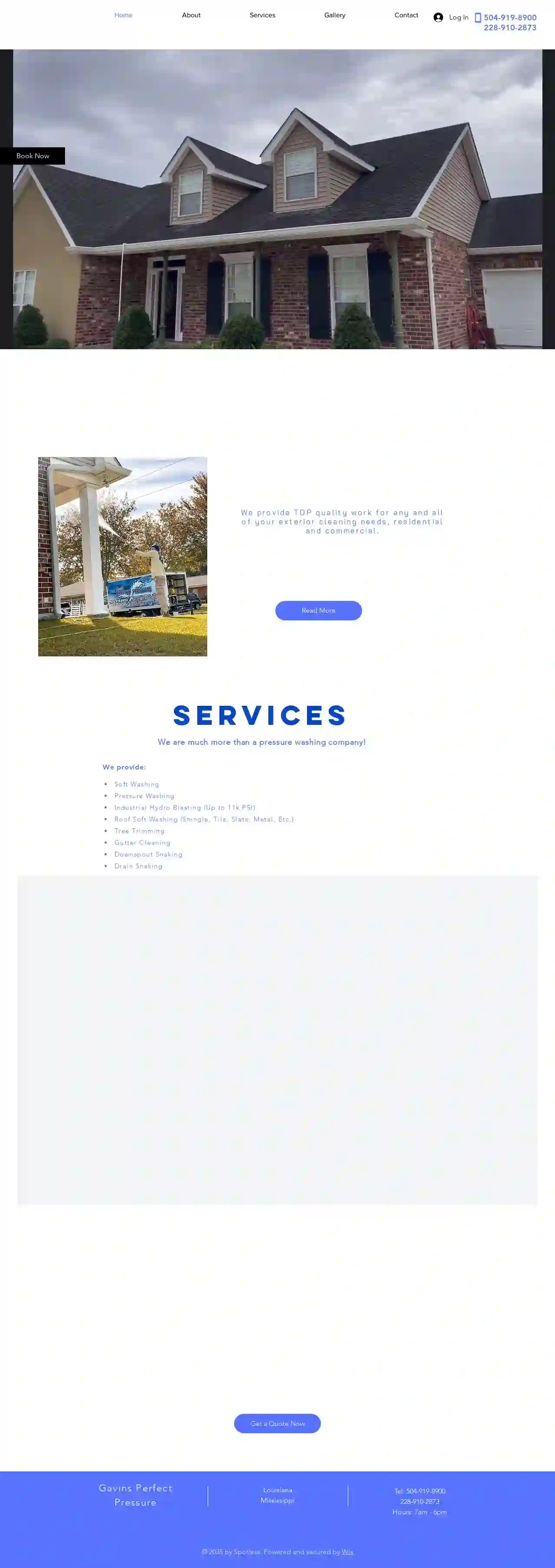
Gavin's Perfect Pressure
518 reviewsNew Orleans, LA, 123 Main St, 70119, USGavin's Perfect Pressure is a professional and reliable exterior cleaning service that offers top quality work for residential and commercial clients. They provide a range of services including soft washing, pressure washing, industrial hydro blasting, roof soft washing, tree trimming, gutter cleaning, downspout snaking, and drain snaking. Their team is dedicated to providing hassle-free estimates and ensuring customer satisfaction.
- Services
- Why Us?
- Accreditations
- Our Team
- Testimonials
- Gallery
Get Quote
Neptune ProWash
546 reviewsLuling, LA, USTransform Your Space With Our Expert Services Welcome to Neptune ProWash, where we specialize in rejuvenating residential and commercial properties. Our range of services, including holiday lighting, soft washing, pressure washing, roof washing, gutter cleaning, and concrete cleaning, is designed to enhance the beauty and value of your property. Discover our commitment to quality and customer satisfaction. Leading Pressure Washing Services in Luling, LA, and the Greater New Orleans Area At Neptune ProWash, located in the heart of Luling, LA, and serving the Greater New Orleans area, we are passionate about serving our community. Since 2018, our team has been dedicated to delivering pressure washing services that surpass expectations. We’re not just about pressure washing; we embrace a holistic approach to maintaining your property’s exterior. From holiday lighting, soft washing, pressure washing, roof washing, gutter cleaning, to concrete cleaning, our trained staff uses both traditional and innovative techniques for optimal results. As a local business, we are deeply rooted in the community, ensuring that each project reflects our commitment to enhancing the beauty and value of your property with our professional pressure washing services. Work With Us (504) 452-2455 [email protected] Luling, LA Why Choose Us? Experience Unmatched Service With Us Choosing Neptune ProWash means more than just getting a service; it’s about experiencing the dedication and expertise that sets us apart. Our team, with 6 years of experience, is trained in the latest techniques to ensure safe and effective cleaning. We understand the unique challenges of maintaining properties in Southern Louisiana and tailor our services to meet these needs. We ensure that your residential or commercial property always looks its best. With us, you’re not just hiring a contractor; you’re partnering with a team that values your property as much as you do. Expert Experience Guaranteed! Uncover a World of Superior Cleaning Services Neptune ProWash offers a diverse array of services to meet all your exterior cleaning needs. Our holiday lighting service provides hands-off, custom-designed lighting installations, ensuring your property shines bright during the festive season. For delicate surfaces, our soft washing technique is perfect, gently removing dirt without damage. Pressure washing is our forte, rejuvenating various surfaces from patios to pool decks with precision. Our roof washing service transforms your roof, making it look brand new, while our gutter cleaning ensures your gutters are free from debris and functioning optimally. Lastly, our concrete cleaning service revitalizes sidewalks, driveways, and commercial spaces, enhancing their appearance and safety. Choose Us for Exceptional Cleaning Services Trust Neptune ProWash for reliable and effective cleaning solutions. We’re committed to excellence in every project, ensuring your satisfaction. Explore our services to see how we can transform your property. Read to learn more!
- Services
- Why Us?
- Gallery
Get Quote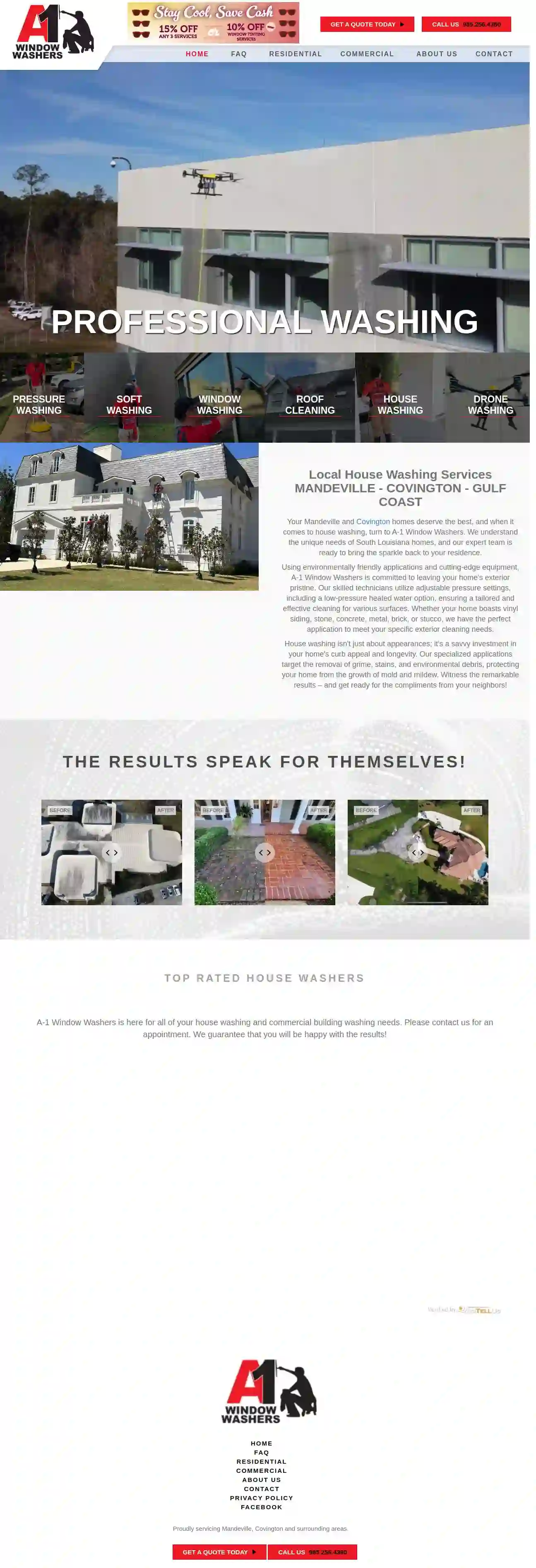
A-1 Window Washers
5125 reviewsSlidell, LA, 123 Main St, 70458, USA-1 Window Washers is a full-service house washing company specializing in soft washing, pressure washing, window washing, sidewalk and driveway cleaning, and more. We take tremendous pride in our superior customer service and guaranteed professional results. Our trained house washing service technicians have the knowledge and equipment necessary to remove stubborn stains from homes and buildings. Our services are not limited to window washing. We use state-of-the-art equipment for pressure washing, roof cleaning, gutter cleaning and brightening, fence cleaning, awning cleaning, and much more. If it is an exterior surface, we have the expertise and equipment to clean it.
- Services
- Why Us?
- Accreditations
- Our Team
- Testimonials
- Gallery
Get Quote
Prime Pressure Washing & Painting, LLC
4.818 reviews8738 Quarters Lake Rd Ste 3, Baton Rouge, 70809, USPrime Pressure Washing & Painting is a leading pressure washing and painting company serving the Baton Rouge metropolitan area. We are dedicated to providing high-quality, affordable services to both residential and commercial clients. Our experienced and knowledgeable team uses top-of-the-line equipment and quality materials to ensure that your property is cleaned and painted properly and safely. We offer a wide range of services, including residential and commercial pressure washing, as well as residential and commercial painting. We are committed to customer satisfaction and guarantee the price and quality of our work. We are open 7 days a week from 7:00 AM to 7:00 PM and offer 24/7 customer support.
- Services
- Why Us?
- Testimonials
- Gallery
Get Quote
ProClean Services
4.9129 reviewsNew Orleans, LA, 1830 Hermosa Street, 70114, USProClean Services is the highest-rated pressure washing company in NOLA. We are a family owned and operated company proudly serving the New Orleans and surrounding areas for over 20 years! So Trust us for all your residential and commercial cleaning needs! ProClean Services is 100% confident that if we can’t get it Clean, no one can! I look forward in being of service to you. Our cleaning experts in New Orleans are respectful of your home and business, and truly take pride in our work. You can be sure the job will get done right the first time. As the owner and operator of a quality residential and commercial cleaning service in New Orleans, I believe in one to one service with 100% satisfaction on All of our work with special focus on the importance of customer satisfaction. We offer a wide selection of cleaning and damage prevention services and offer free on-site or telephone estimates for all of New Orleans and surrounding areas cleaning needs.
- Services
- Why Us?
- Accreditations
- Our Team
- Testimonials
- Gallery
Get Quote
703 Pressure Wash, LLC
Alexandria, US703 Pressure Wash, LLC has been serving Northern Virginia communities since 2016. As a family-owned business, we specialize in providing high-quality house washing services, including decks, driveways, sidewalks, and patios. Our mission is to deliver exceptional service and cater to each project's unique needs. We strive for open communication and strive to exceed your expectations.
- Services
- Why Us?
- Our Team
- Testimonials
- Gallery
Get Quote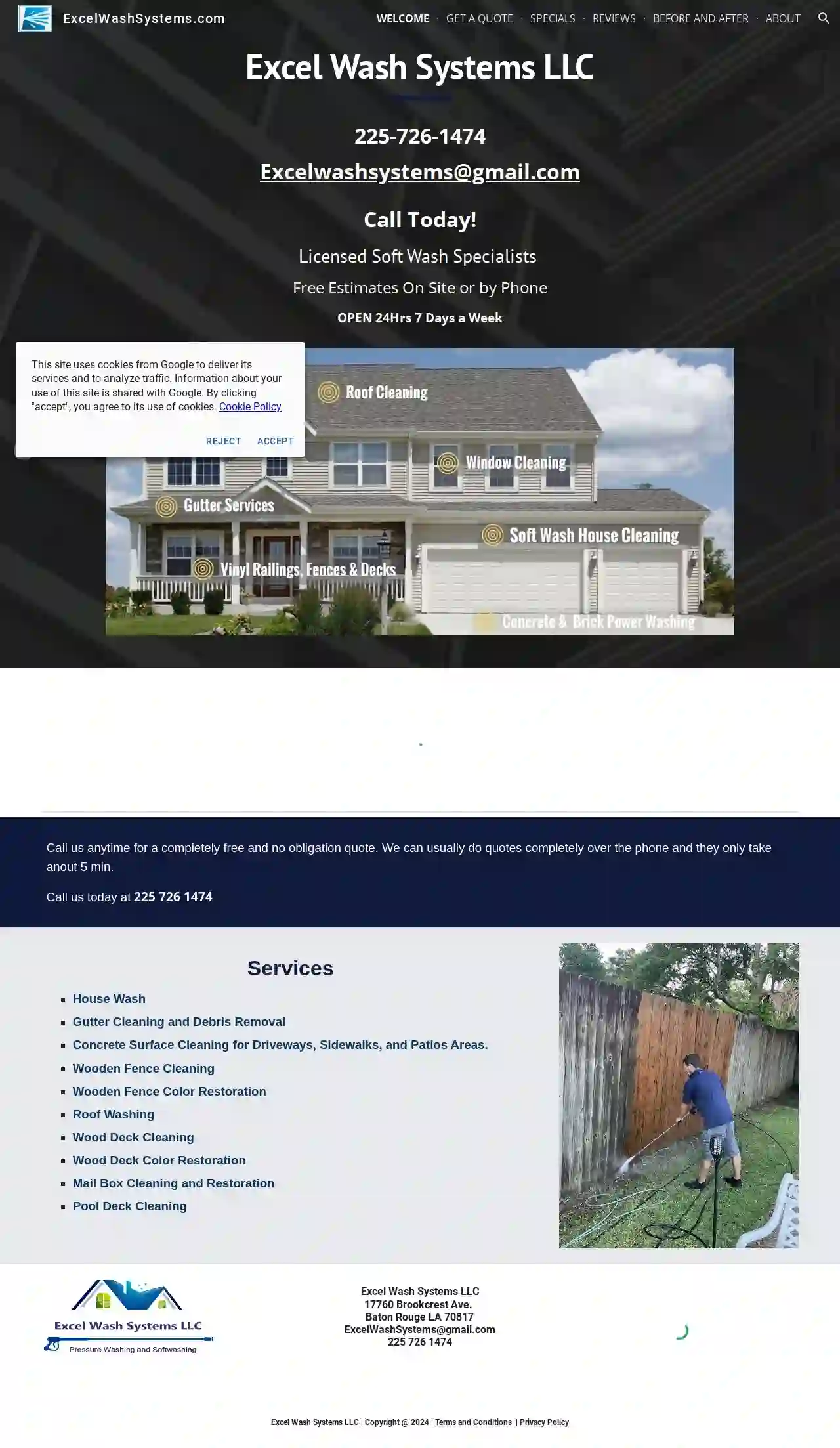
Excel Wash Systems LLC
3.76 reviews17760 Brookcrest Ave., Baton Rouge, 70817, USExcel Wash Systems LLC is a licensed soft wash specialist serving residential and commercial clients in Baton Rouge, LA. We offer a range of cleaning and restoration services, including house washing, gutter cleaning, concrete surface cleaning, wooden fence cleaning, roof washing, wood deck cleaning, mailbox cleaning, and pool deck cleaning. Our soft wash method effectively kills algae, mold, and mildew, leaving surfaces clean and clear for longer. We pride ourselves on professional work, flexible scheduling, and fair pricing. For commercial clients, we provide services such as parking garage cleaning, parking lot cleaning, dumpster pad cleaning, metal building/roof cleaning, outdoor stairwell and landing cleaning, water tank cleaning, and window cleaning. Contact us today for a free, no-obligation quote. We can often provide quotes over the phone, which typically only take about 5 minutes.
- Services
- Why Us?
- Gallery
Get Quote
All Clean Pressure Washing
576 reviewsNew Orleans, LA, 123 Main St, 70119, USOur company is a leading provider of exterior cleaning services, specializing in house washing, deck and fence restoration, roof cleaning, driveway cleaning, pool deck cleaning, rust removal, window cleaning, and gutter cleaning. We serve both residential and commercial clients, offering customized solutions to meet their unique needs. With years of experience and a commitment to quality, we strive to provide exceptional service and results.
- Services
- Why Us?
- Accreditations
- Our Team
- Testimonials
- Gallery
Get Quote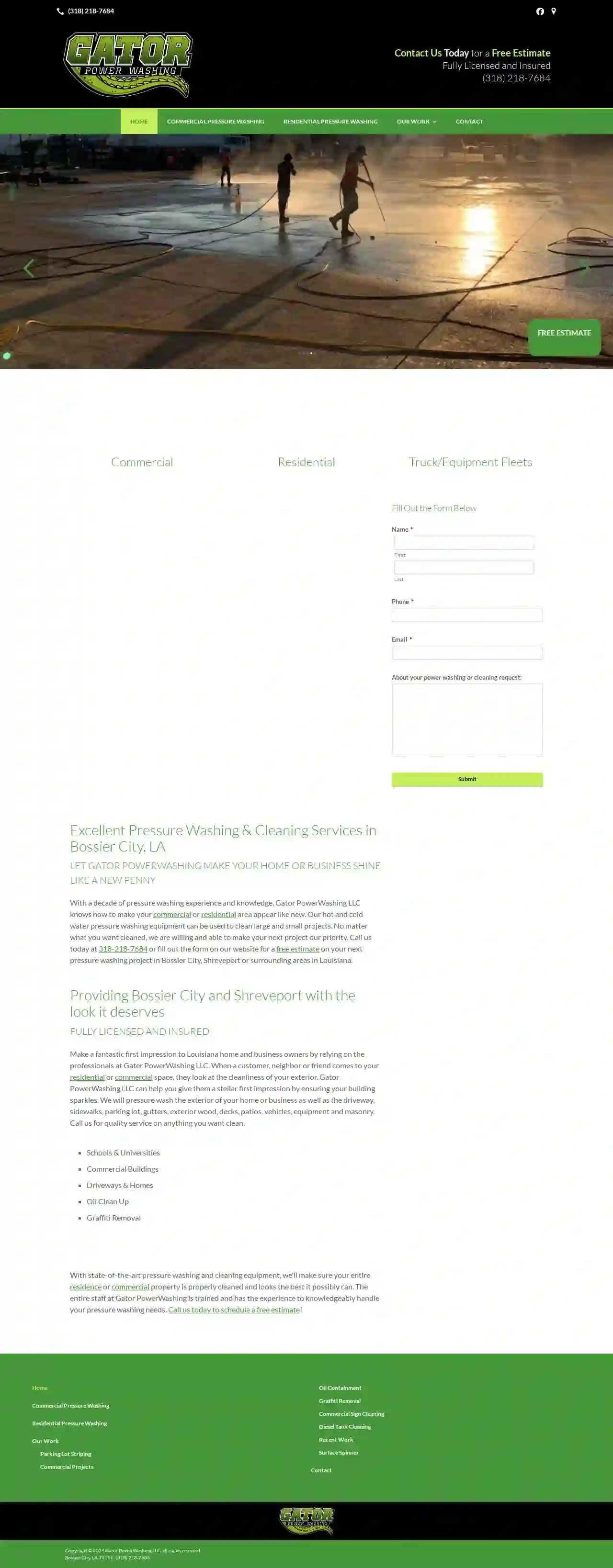
Gator PowerWashing LLC
5124 reviews513 Perfect Place, Bossier City, 71111, USGator PowerWashing LLC is a fully licensed and insured company providing commercial and residential pressure washing services to Bossier City and Shreveport, LA. With a decade of experience, they offer a range of services including exterior cleaning, driveway and sidewalk cleaning, oil containment, graffiti removal, and more. Their team is trained and experienced in handling various pressure washing needs.
- Services
- Why Us?
- Gallery
Get Quote
Over 60,241+ Janitorial Services onboarded
Our cleaning contractors operate in DeRidder and surrounding areas!
CleaningMatch has curated and vetted Top Cleaning Contractors in and around DeRidder. Find a top & reliable pro today.
Frequently Asked Questions About Pressure Washing
- Online Reviews: Check online reviews on platforms like Google, Yelp, and Facebook to gauge customer satisfaction and service quality.
- Experience and Expertise: Look for companies with a proven track record and experience in pressure washing various surfaces.
- Licensing and Insurance: Ensure the company is licensed and insured to protect you from liability in case of accidents or damage.
- Equipment and Techniques: Inquire about the company's equipment and techniques to ensure they use appropriate pressure levels and cleaning solutions for different surfaces.
- Quotes and Pricing: Obtain detailed quotes from multiple pressure washing companies and compare their pricing. Make sure the quotes are transparent, outlining all services and costs.
- Professionalism and Communication: Choose a company that is responsive, provides clear communication, and demonstrates professionalism in its interactions.
- Enhanced Curb Appeal: Pressure washing removes dirt, grime, and stains, instantly revitalizing the appearance of your property and boosting curb appeal.
- Improved Health and Safety: Pressure washing removes mold, mildew, algae, and other contaminants that can pose health risks and create slippery surfaces.
- Increased Property Value: A well-maintained exterior, achieved through regular pressure washing, can increase the value of your property.
- Preventative Maintenance: Pressure washing removes dirt and grime that can deteriorate surfaces over time, extending the lifespan of your driveway, deck, fence, and other exterior features.
- Preparation for Painting or Staining: Pressure washing is an essential step before painting or staining, as it provides a clean and receptive surface for the new coating to adhere to.
- Pressure Washing: If your siding is in good condition but dirty or stained, pressure washing can effectively restore its appearance without the need for painting.
- Painting: If your siding is faded, chipped, peeling, or damaged, pressure washing alone may not be sufficient. Painting provides a fresh coat of protection and a new look.
- Pressure Washing Before Painting: Pressure washing is an essential step before painting, as it removes dirt, grime, and loose paint, creating a clean surface for the new paint to adhere to.
How do I find a good pressure washing service?
Utilize online directories like CleaningMatch to find and compare qualified pressure washing services in your area.
What are the benefits of pressure washing?
Whether you're looking to improve your property's appearance, protect its value, or enhance health and safety, pressure washing is a valuable investment.
What is the difference between pressure washing and soft washing?
Pressure washing uses high-pressure water spray to blast away dirt, grime, and other stubborn contaminants from hard surfaces. It's effective for cleaning driveways, decks, patios, fences, and siding.
Soft washing utilizes low-pressure water combined with specialized cleaning solutions to gently remove dirt, mold, mildew, and algae from delicate surfaces like roofs, siding, and painted surfaces. Soft washing is less abrasive than pressure washing, preventing damage to sensitive materials.
Choosing the appropriate cleaning method depends on the type of surface, its condition, and the desired cleaning outcome. Consult with a professional pressure washing company to determine the best approach for your specific needs.
Is it better to pressure wash or paint my house?
Assess the condition of your siding and your desired outcome to determine whether pressure washing, painting, or a combination of both is the best approach.
How do I find a good pressure washing service?
- Online Reviews: Check online reviews on platforms like Google, Yelp, and Facebook to gauge customer satisfaction and service quality.
- Experience and Expertise: Look for companies with a proven track record and experience in pressure washing various surfaces.
- Licensing and Insurance: Ensure the company is licensed and insured to protect you from liability in case of accidents or damage.
- Equipment and Techniques: Inquire about the company's equipment and techniques to ensure they use appropriate pressure levels and cleaning solutions for different surfaces.
- Quotes and Pricing: Obtain detailed quotes from multiple pressure washing companies and compare their pricing. Make sure the quotes are transparent, outlining all services and costs.
- Professionalism and Communication: Choose a company that is responsive, provides clear communication, and demonstrates professionalism in its interactions.
Utilize online directories like CleaningMatch to find and compare qualified pressure washing services in your area.
What are the benefits of pressure washing?
- Enhanced Curb Appeal: Pressure washing removes dirt, grime, and stains, instantly revitalizing the appearance of your property and boosting curb appeal.
- Improved Health and Safety: Pressure washing removes mold, mildew, algae, and other contaminants that can pose health risks and create slippery surfaces.
- Increased Property Value: A well-maintained exterior, achieved through regular pressure washing, can increase the value of your property.
- Preventative Maintenance: Pressure washing removes dirt and grime that can deteriorate surfaces over time, extending the lifespan of your driveway, deck, fence, and other exterior features.
- Preparation for Painting or Staining: Pressure washing is an essential step before painting or staining, as it provides a clean and receptive surface for the new coating to adhere to.
Whether you're looking to improve your property's appearance, protect its value, or enhance health and safety, pressure washing is a valuable investment.
What is the difference between pressure washing and soft washing?
Pressure washing uses high-pressure water spray to blast away dirt, grime, and other stubborn contaminants from hard surfaces. It's effective for cleaning driveways, decks, patios, fences, and siding.
Soft washing utilizes low-pressure water combined with specialized cleaning solutions to gently remove dirt, mold, mildew, and algae from delicate surfaces like roofs, siding, and painted surfaces. Soft washing is less abrasive than pressure washing, preventing damage to sensitive materials.
Choosing the appropriate cleaning method depends on the type of surface, its condition, and the desired cleaning outcome. Consult with a professional pressure washing company to determine the best approach for your specific needs.
Is it better to pressure wash or paint my house?
- Pressure Washing: If your siding is in good condition but dirty or stained, pressure washing can effectively restore its appearance without the need for painting.
- Painting: If your siding is faded, chipped, peeling, or damaged, pressure washing alone may not be sufficient. Painting provides a fresh coat of protection and a new look.
- Pressure Washing Before Painting: Pressure washing is an essential step before painting, as it removes dirt, grime, and loose paint, creating a clean surface for the new paint to adhere to.
Assess the condition of your siding and your desired outcome to determine whether pressure washing, painting, or a combination of both is the best approach.